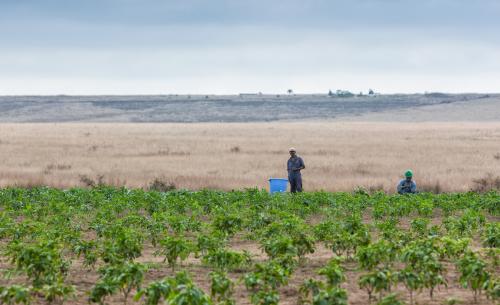The COVID-19 pandemic has unleashed the first recession in a quarter of a century across the African continent, but many experts believe that the economic shock offers an unprecedented opportunity to implement a green transformation policy that promotes an inclusive, sustainable economic recovery. In Chapter 1 of AGI’s Foresight Africa 2021, Gunnar Köhlin, Ira Dorband, Jan Christoph Steckel, and Thomas Sterner discuss the merits of a carbon tax as an effective policy tool to raise substantial revenues, reduce income inequality, and incentivize a green economic recovery.
According to the authors, due to the depressed global oil prices caused by the pandemic, policymakers have an opportunity to introduce carbon pricing on fossil fuels without raising fuel prices beyond pre-pandemic levels. As such, the authors suggest that a $75-per-ton carbon tax, the benchmark carbon tax the International Monetary Fund estimates would be required to keep global warming below 2 degrees Celsius, would increase fuel prices at the pump by $0.17 per liter. When multiplied by current oil consumption in Africa—approximately 4 million barrels per day—the policy would generate $40 billion in additional annual tax revenue across the continent.
The authors also argue that, though such a tax seems that it would adversely affect the poor, if revenues are used for pro-poor redistribution policies, the result would actually be progressive because the lowest-income households consume significantly less fuel than wealthier ones. Figure 1 depicts the distribution of the carbon tax burden, where a value less than one indicates that the lowest income group pays less than the national average. Notably, only in South Africa is a carbon tax projected to be regressive, burdening poorer taxpayers more than wealthier taxpayers; however, the tax’s income effects on the lowest income groups in Gabon, Cameroon, and Morocco are also weaker relative to the rest of the continent. Elsewhere on the continent, however, carbon taxes can directly reduce income inequality via effective redistribution.
Aggregate carbon emissions among African countries have approximately doubled since 1990. Figure 2 depicts the share of African carbon emissions by country over time, illustrating the magnitude of growth in emissions by the region since 1990. Significant increases in pollution emissions are typical in early stages of development—as characterized by the Environmental Kuznets Curve—and eventually level off and then fall as GDP per capita rises. The composition of African emissions has been and continues to be dominated by South Africa, although its share in total emissions—just under half in 1990—has been dwarfed by the rest of the continent since 1990. The share of emissions by the rest of African countries has risen considerably. Consequently, the authors emphasize the power of a carbon tax to transform the consumption and production choices in carbon-intense sectors, fostering the transition to a low-carbon economy.
Carbon taxes have been a widely proposed policy solution to correct market failures and account for the true cost of emissions in both developed and developing economies.
For more actionable ideas on achieving a low-carbon economic transition in Africa, consider reading, “How Africa can show the world the way to a low-carbon future: 10 facts, 10 actions.”
For more on the risks of climate change in Africa and strategic responses to its challenges, consider reading, “Confronting climate change” and “Confronting the challenges of climate change on Africa’s coastal areas.”
For more on shared African efforts to combat climate change, see “Even before the U.S. left the Paris Agreement, Africa stepped up to the plate on climate change.”









Commentary
Figures of the week: Carbon taxes can fuel green economic recovery and reduce income inequality
January 27, 2021